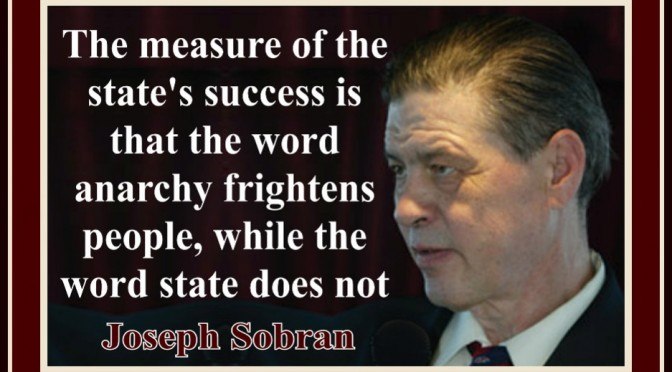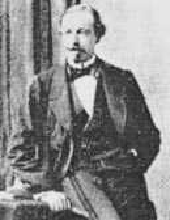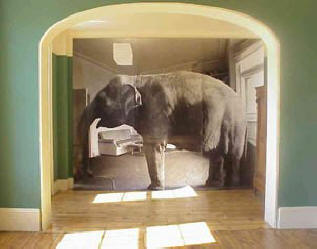 Jews hated him.
Jews hated him.
Sailer’s “Joe Sobran, RIP” links Coulter’s Not your average joe.
A Sailer commenter links Michael Tomasky’s Rick Sanchez and Joe Sobran, which links Jeet Heer’s Joseph Sobran: Far Worse than a Holocaust Skeptic.
Sobran once wrote that “anti-semite” used to mean a man who hated jews. Now it means a man who is hated by jews.
In Hard-line commentator, at the Washington Post, Matt Schudel writes:
Over the years, Mr. Sobran’s views veered ever more wildly to the right, beyond the ken of National Review and anything resembling the mainstream. He praised an unabashedly racist publications called Instauration, which, in Mr. Sobran’s own words, was “openly and almost unremittingly hostile to blacks, Jews, and Mexican and Oriental immigrants.”
An archive of Wilmot Robertson’s Instauration Magazine is online. Go see what the fuss is about.
How I Was Fired By Bill Buckley is Sobran’s account of his ejection from the mainstream for violating what Buckley called “the structure of prevailing taboos”.
UPDATE 19 Oct 2010: A few links provided by Jim Jones in the comments, from which I’ve extracted samples of Sobran’s thoughts about jews.
Sobran’s — The Jewish Faction, May 2004:
In truth, the charge of “Christ-killing” is hard to find anywhere, outside of schoolyard taunts. Yet the Tribe “remembers” it, just as innumerable baseball fans used to “remember” seeing Babe Ruth’s legendary (and apocryphal) “called shot” in the 1932 World Series, the most famous home run never hit. Such non-happenings are a regular feature of Tribal memory, as witness the many testimonies of “Holocaust survivors” that have turned out to be delusions or outright forgeries. A large proportion of the Tribe is still absolutely convinced that Pius XII was “Hitler’s Pope,” despite mountainous, and mounting, evidence to the contrary. (Hitler’s media called Pius “the Jews’ mouthpiece.”)
Sobran’s — The Jewish Establishment, September 1995:
Not only persecution of Jews but any critical mention of Jewish power in the media and politics is roundly condemned as “anti-Semitism.” But there isn’t even a term of opprobrium for participation in the mass murders of Christians. Liberals still don’t censure the Communist attempt to extirpate Christianity from Soviet Russia and its empire, and for good reason — liberals themselves, particularly Jewish liberals, are still trying to uproot Christianity from America.
It’s permissible to discuss the power of every other group, from the Black Muslims to the Christian Right, but the much greater power of the Jewish Establishment is off-limits. That, in fact, is the chief measure of its power: its ability to impose its own taboos while tearing down the taboos of others — you might almost say its prerogative of offending. You can read articles in Jewish-controlled publications from the Times to Commentary blaming Christianity for the Holocaust or accusing Pope Pius XII of indifference to it, but don’t look for articles in any major publication that wants to stay in business examining the Jewish role in Communism and liberalism, however temperately.
When Joe McCarthy accused people of being Communists, the charge was relatively precise. You knew what he meant. The accusation could be falsified. In fact the burden of proof was on the accuser: when McCarthy couldn’t make his loose charges stick, he was ruined. (Of course, McCarthy was hated less for his “loose” charges than for his accurate ones. His real offense was stigmatizing the Left.)
The opposite applies to charges of “anti-Semitism.” The word has no precise definition. An “anti-Semite” may or may not hate Jews. But he is certainly hated by Jews. There is no penalty for making the charge loosely; the accused has no way of falsifying the charge, since it isn’t defined.
A famous example. When Abe Rosenthal accused Pat Buchanan of “anti-Semitism,” everyone on both sides understood the ground rules. There was a chance that Buchanan would be ruined, even if the charge was baseless. And there was no chance that Rosenthal would be ruined — even if the charge was baseless.
Such are the rules. I violate them, in a way, even by spelling them out.
“Anti- Semitism” is therefore less a charge than a curse, an imprecation that must be uttered formulaically.
Sobran’s — “For Fear of the Jews”, September 2002:
It was once considered “anti-Semitic” to impute “dual loyalty” to Jews — that is, to assert that most American Jews divide their loyalty between the United States and Israel. This is now passé. Today most politicians assume, as a matter of course, that Israel commands the primary loyalty of Jewish voters. Are they accused of “anti-Semitism” for doing so? Does this assumption cost them Jewish votes? Not at all! Dual loyalty nothing! Dual loyalty would be an improvement!
Once again, it’s a practical necessity to know what it would be professional suicide to say. No politician in his right mind would accuse Jews of giving their primary loyalty to Israel; but most politicians act as if this were the case. And they succeed.
You can read Jewish publications like Commentary for years, and you’ll read interminable discussions about what’s good for Israel, but you’ll never encounter the slightest suggestion that what’s good for Israel might not be good for America. The possibility simply never comes up. The only discernible duty of Jews, it seems, is to look out for Israel. They never have to choose between Israel and the United States. So much for the “canard” of dual loyalty.







